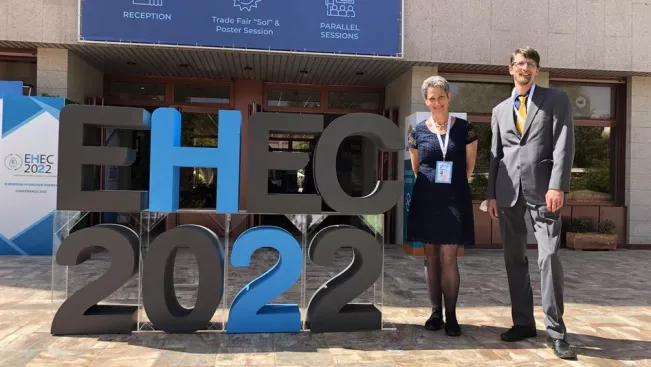International Centre for Sustainable Development (IZNE)
European Hydrogen Energy Conference 2022 in Madrid

Spain - pioneer in green hydrogen production
Spain is the European country with the greatest potential for producing hydrogen from renewable energy sources. So-called green hydrogen is key to the reduced use of fossil fuels targeted in many European roadmaps (including Spain's and Germany's). Cheap hydrogen production could make Spain an important exporter of hydrogen to other EU countries. It is therefore not surprising that hydrogen production by means of electrolysis and electricity from renewable energy was the central focus topic at the conference in Madrid.
H-BRS participates for the first time and presents results from FlexHyX project
In numerous presentations from industry and science, news and methods on the topic of hydrogen were presented and discussed. The Bonn-Rhein-Sieg University of Applied Sciences (H-BRS) was represented by Prof. Stefanie Meilinger and PhD student Steffen Schedler, who presented the first results from the FlexHyX project at the conference.
Project FlexHyX
In the FlexHyX project, researchers at the H-BRS are investigating the flexibility options of regenerative hydrogen production and use by means of decentralised stationary metal hydride storage and integration into gas grids.
Decentralised hydrogen storage offers flexibility in the storage of electrical energy from renewable energy sources and thus enables their use independent of generation. Using dynamic simulation, the researchers are investigating various possible applications of an innovative hydrogen storage system based on a metal hydride and how these can be connected together in a network.They are paying particular attention to stationary hydrogen storage for increasing the energy self-consumption of photovoltaic roof systems across the seasons. Professor Stefanie Meilinger and doctoral student Steffen Schedler were able to establish contacts and develop ideas for cooperation through the professional exchange among the conference participants.
With the idea of networked hydrogen storage systems, the H-BRS is pursuing an area of research in which only very few players worldwide are active to date. Several professors from the Institute of Technology, Resource Efficiency and Energy Efficiency (TREE) and the International Centre for Sustainable Development (IZNE) are successfully working together in this field. The group now comprises more than 10 people working on the production, storage and distribution as well as sustainability issues of hydrogen.
Contact

Stefanie Meilinger
Professor for Sustainable Technologies, esp. Energy Efficiency and Renewable Energies, Director of the International Centre for Sustainable Development (IZNE), Department Engineering and Communication (IWK)
Research fields
Location
Sankt Augustin
Room
F 321
Address
Grantham-Allee 20
53757 Sankt Augustin
Telephone
+49 2241 865 718